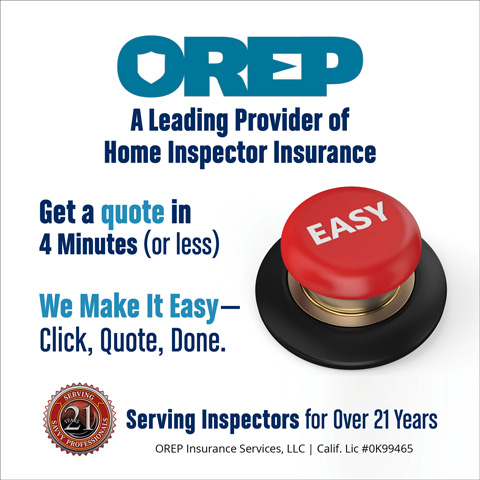 | > E&O/GL Insurance for Home Inspectors Competitive Rates, Broad Coverage, Free Risk Management, online inspection support for tough questions, discounts on education and more… Professional Coverage, Competitive Pricing Shop OREP today! |
Do You Need E&O Insurance as a Home Inspector?
by Kassandra Jessup-Prater, RWS Insurance Services
Experienced home inspectors know what to look for in any given job, and most veteran inspectors have detailed procedures and practices for reporting their findings in complete and comprehensive ways to clients.
However, even the most experienced home inspectors sometimes make mistakes…and even if you don’t make a mistake, a particularly litigious client can still wreck your business’ progress and tie you up in court for years if you’re not careful.
To protect yourself and your business, you should know whether you need E&O insurance as a home inspector, what types of E&O insurance is available to you, and when you might need it. But first, if you’re unfamiliar with E&O insurance, let’s go over the basics.
What Is E&O Insurance?
E&O insurance is shorthand for Errors and Omissions insurance. It’s sometimes known as “professional liability insurance.”
An E&O insurance policy helps protect service professionals and service-providing businesses against the financial consequences of lawsuits related to their work. E&O insurance covers specific types of liability claims, like:
• Negligence or substandard service delivery
• Failure to deliver services or meet deadlines (contract breaches)
• Errors or oversights (omissions) in the work
• Misrepresentations or inaccurate advice
E&O insurance is different from general liability, which tends to cover physical injuries and property damage. General liability claims, for home inspectors, typically involve “oopsie” mistakes like leaving water running after you leave the inspection, accidentally putting your foot through the floor, and similar stuff.
How Does E&O Insurance Work?
E&O policies typically cover expenses related to defending against such claims, including legal fees and court costs.
However, the scope of E&O coverage may vary from insurer to insurer, so it’s important to obtain and read the full policy, particularly where it discusses the specifics of its coverage and what costs it’ll handle.
It’s important to understand that E&O insurance generally won’t cover criminal and/or illegal acts, bodily injury, and other non-negligent failures of service. It may not cover subcontractors or temporary employees, either, so be careful when adding non-salaried staff to handle your inspection jobs.
Of course, it’s highly unlikely a home inspector will injure a client while inspecting a home, and if you don’t steal anything or stab anyone while you’re on the job, you should probably be clear of criminal liability as well.
But these gaps don’t mean you shouldn’t have E&O insurance. If anything, you may want to require any subcontractors or temporarily-employed inspectors to carry their own E&O policies, just to be on the safe side.
How Much Does E&O Insurance Cost?
The costs of E&O insurance will vary between insurers, but it’s generally settled into a predictable range.
According to The Hartford Insurance, E&O policies typically cost between $500 to $1,000, per employee, per year. Insureon says the median cost of an E&O policy is $59 per month, or $708 per year, but it offers some industry-specific numbers as well—real estate professionals as a broad category (including agents and appraisers) pay a median premium of $665 per year.
Based on these reference points, you can probably budget about $83 per employee per month for your E&O policy. At this level, you’ll be able to cover premiums up to the maximum expected annual limit of $1,000 per year. If your policy is cheaper, you can always adjust your budget later, or allocate your savings towards other business initiatives.
(story continues below)
(story continues)
Do you Need E&O Insurance as a Home Inspector?
Want to know if you should get E&O insurance?
Fill out this checklist, and when you’re done, we’ll see if you’ve checked off enough qualifications to go ahead and purchase an E&O policy in the near future.
☐ Do you NOT live in any of the following states?
(states not on this list require home inspectors to carry E&O)
• Colorado
• Connecticut
• Delaware
• Georgia
• Hawaii
• Idaho
• Illinois
• Indiana
• Iowa
• Louisiana
• Maine
• Minnesota
• Missouri
• Montana
• Nebraska
• New Hampshire
• New Mexico
• South Carolina
• South Dakota
• Utah
• Vermont
• Washington
• West Virginia
• Wisconsin
• Wyoming
☐ Do you offer ancillary services (mold, radon, etc.)?
☐ Have you (or any inspector you know) ever been threatened with a lawsuit?
☐ Have you ever been told you “missed” or didn’t notice a major issue during an inspection, such as water damage, odd smells, deterioration, etc.)?
☐ Do you think you might ever be sued by a client in the future?
☐ Do you want to pay for legal damages out of your
own pocket?
This is a pretty straightforward checklist for most inspectors. If you check off most boxes, or at least every box that doesn’t ask where you live, you should certainly consider getting E&O insurance.
However, the most important question to check off will ultimately be the last one. A busy professional, with enough clients on a long enough timeline, is almost certain to face a lawsuit—merited or not. Even if you think it might save you money to skip out on your E&O insurance, any “savings” can quickly be wiped out by the cost of just one lawsuit. Paying $1,000 a year for E&O coverage might seem steep, but you could easily lose tens (or hundreds) of thousands of dollars if a liability-based lawsuit is ever decided against you—or even if it’s not, since retaining good legal counsel is never cheap.
How to Choose the Right E&O Insurance Provider
If all else is equal, you’d probably just look for the insurer promising you the lowest premiums for the most robust coverage. But all else is rarely equal. Insurers offer varying levels of coverage at varying rates. Some bundle E&O liability with general liability, while others keep the two types of coverage strictly separate.
When searching for an E&O policy provider, look for an insurer with a reputation for good service and low costs. Check your policy details closely before signing anything, so you can understand how much your policy will cover (the coverage limit), what specific issues it will and will not cover, who it will cover, and how you should go about filing a claim if you should ever need to.
One important consideration is how much experience an insurance provider has in actually defending home inspectors. Some insurers offer broad E&O liability policies for professionals; this doesn’t mean those insurers know their way around home inspections, or that the person who might handle your claim knows anything about the work you do.
Home inspector claims are unique and you will want to purchase from a provider with extensive experience defending home inspectors. This means that even if you get a broad coverage policy at a good price, if the insurance provider isn’t experienced in home inspector claims, they may not handle your claim correctly or will pay out on a frivolous claim. When frivolous claims are paid out it will ultimately cost you more in the long run as you’ll have a loss associated with your insurance account and your rates will go up.
Inspector-specific E&O insurance should provide tailored coverage for a home inspector’s specific needs—for example, if you only offer standard inspections, you may not need broader E&O that covers ancillary services, such as inspections for radon, mold, or termites. These insurers tend to base coverage and limits on each inspector’s needs while accounting for applicable state regulations or other location-based requirements.
These companies would make good starting points in your search, but you shouldn’t feel limited to inspection-focused insurers. You should be in good hands as long as your insurer has reasonable premiums, good service, and strong coverage.
About the Author
Kassandra Jessup-Prater is a Licensed Adjuster for RWS Insurance Services. She holds her Adjuster License in 48 states. Kassandra also holds a Degree in Paralegal Studies and Graduated with Presidential Honors in 2010. With over 13 years of experience in the Legal and Insurance Fields, Kassandra works hard every day to provide excellent service to all RWS Insurance customers.
OREP Insurance Services, LLC. Calif. License #0K99465




by Dave Park
This information should be a selling feature for inspectors that carry E&O insurance protection. Many do not carry and this protection separates professionals from the trades. Cheers! – Dave
-